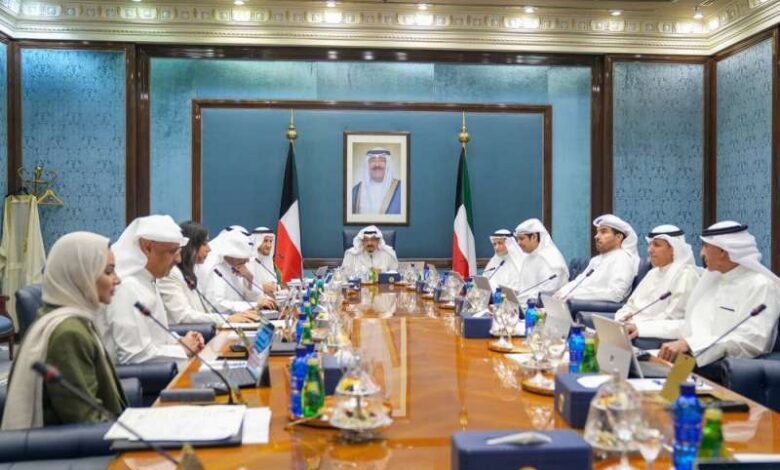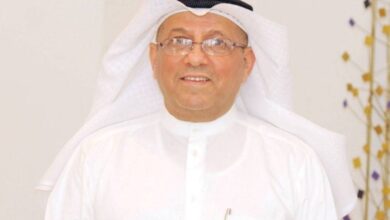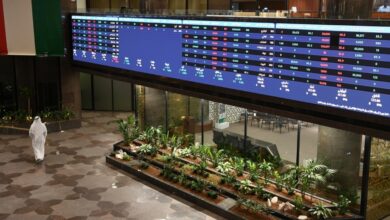Cabinet greenlights nationality loss and withdrawal decisions
The Minister of Public Works and the Minister of State for Municipal Affairs has been tasked with taking the necessary measures to replace individuals’ names on roads, streets, and squares with numbers.

-
The Al-Zour Refinery project is one of the most important oil refining projects globally and marks a qualitative shift in the environmentally friendly oil industry, representing a new milestone on the path to sustainable development in the State of Kuwait.
-
The Council of Ministers has directed that roads, streets, and squares in Kuwait should be named after sultans, kings, rulers, princes, and heads of state.
-
The Council of Ministers tasked the authorities involved in the Mubarak Al-Kabeer Port project to accelerate and continue completing the necessary procedures for its successful completion.
On Tuesday morning, the Council of Ministers convened its weekly meeting at Bayan Palace, presided over by His Highness Sheikh Ahmad Abdullah Al-Ahmad Al-Sabah, the Prime Minister according to a report published in the Al Rai newspaper.
During the meeting, the council approved the minutes of the Supreme Committee for the Investigation of Kuwaiti Nationality, which covered cases of nationality loss and withdrawal in accordance with the provisions of the law.
Full operation of the Al-Zour Refinery
At the beginning of its meeting, the Council of Ministers praised the official celebration of the full operation of the Al-Zour Refinery, which took place last Wednesday at the Al-Zour Oil Complex under the patronage and presence of His Highness the Amir Sheikh Mishal Al-Ahmad.
The council noted that this project is one of the most important oil refining projects globally and marks a qualitative shift in the environmentally friendly oil industry, representing a new milestone on the path to sustainable development in the State of Kuwait.
The Council of Ministers expressed sincere thanks and appreciation to Dr. Imad Al-Ateeqi, the Deputy Prime Minister, Minister of Oil, and Chairman of the Board of Directors of the Kuwait Petroleum Corporation, as well as to all national cadres working in both the Kuwait Petroleum Corporation and its subsidiaries, the Kuwait Integrated Petroleum Industries Company, and everyone who contributed to the completion of this significant development project.
This achievement confirms Kuwait’s position as one of the leading countries in oil production and its derivatives, under the wise leadership and sound vision of His Highness the Amir Sheikh Meshal Al-Ahmad Al-Jaber Al-Sabah and His Highness the Crown Prince Sheikh Sabah Khaled Al-Hamad Al-Sabah.
Maintenance of roads, highways
The Council of Ministers was informed about the approval by the Board of Directors of the Central Agency for Public Tenders, during its meeting on Monday at the agency’s headquarters, to consider all proposals submitted by the Ministry of Public Works. These proposals amount to ‘18’ general practices for the maintenance of roads and highways in various regions of the State of Kuwait. This action is in line with the directives of His Highness Sheikh Ahmad Abdullah Al-Ahmad Al-Sabah, the Prime Minister, emphasizing the urgency of accelerating and commencing immediate comprehensive repairs and maintenance of streets to benefit road users.
Anti-money laundering
On the other hand, the Council of Ministers reviewed the report of the National Committee for Combating Money Laundering and Terrorist Financing regarding the recommendations submitted by the Financial Action Task Force for the Mutual Evaluation of the State of Kuwait (FATF).
The council emphasized its keenness to implement measures preserving Kuwait’s status and reputation. Consequently, the Council of Ministers decided to refer the report to the Ministerial Legal Affairs Committee for a comprehensive study of all legal and procedural aspects related to this matter.
Mubarak Al-Kabeer Port project
In the context of the Council of Ministers’ keenness to oversee project implementation of Mubarak Al-Kabeer Port, they reviewed a visual presentation detailing the latest developments concerning the establishment and operation of project.
The council also monitored the progress of executive and construction works related to the project, along with the key recommendations. The Council of Ministers tasked the relevant authorities involved in the project to accelerate and continue completing the necessary procedures for its successful completion.
Economic Zone project
The cabinet also reviewed a visual presentation regarding the latest developments in the Northern Economic Zone project, which stands as one of the fundamental pillars and promising challenges that bolster the economy of the State of Kuwait, diversify its non-oil sources of income, and create job opportunities for citizens.
Kuwait-China bilateral agreements
Regarding bilateral agreements, as part of the cabinet’s follow-up on the implementation mechanism of bilateral agreements and memorandums of understanding between the State of Kuwait and the People’s Republic of China, the Council of Ministers reviewed a visual presentation concerning the current status of these agreements and memorandums, along with the latest developments in this regard. The Council of Ministers urged the relevant authorities to swiftly finalize these agreements and memorandums of understanding.
The Council of Ministers has decided to refer these projects, bilateral agreements, and memorandums of understanding to the Ministerial Economic Affairs Committee. The committee will prepare a report on them and submit its recommendations to the Council of Ministers.
Roads and streets honor sultans, kings, and rulers
On the other hand, the Council of Ministers has tasked the Minister of Public Works and the Minister of State for Municipal Affairs with taking the necessary measures to replace individuals’ names on roads, streets, and squares with numbers. They are also to present a draft decision to the Council of Ministers regarding this matter.
Furthermore, the council has directed that roads, streets, and squares should be named after sultans, kings, rulers, princes, and heads of state, and that the naming of countries and capitals should follow reciprocity guidelines in accordance with existing procedures and provisions.













